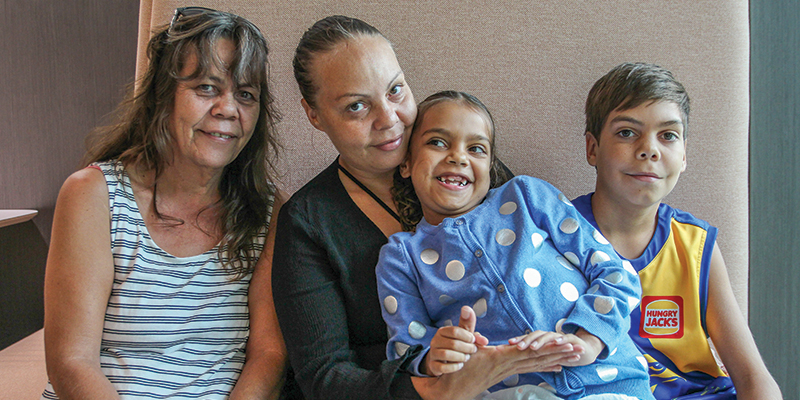
When Katrina Walley took her seven-year-old daughter Tenaya to the local emergency department for the fourth time within a month, she was determined she wouldn’t be leaving without answers.
Tenaya had been complaining of a sore throat, stomach pains, and breathlessness. At night-time, she found it hard to lie down flat to sleep – a sign of heart failure.
“I knew something wasn’t right,” Katrina said. “We got to the hospital around 8 or 9pm. At this point, her oxygen levels started dropping, so she was put on oxygen.”
By 11pm, they were being flown from their home in rural Western Australia to Perth Children’s Hospital via the Royal Flying Doctor Service. On arrival Tenaya was rushed to the intensive care unit (ICU) and put on a life-support machine, where she would remain for the next two weeks.
“I will never forget any of that – seeing my baby in the ICU,” Katrina said.
Katrina was told Tenaya’s heart was failing as a result of rheumatic heart disease (RHD), and that the little girl urgently needed surgery to have one of her heart valves repaired.
“I was in shock at first. I just went and sat in one of the rooms by myself,” Katrina said.
Tenaya was in hospital for a month before she was strong enough to have the surgery. She hated being away from her school, friends, and family, and was scared about having to have surgery.
“By the second month, she started to cry every time she saw a nurse,” Katrina said. “[On the day of the surgery] she was crying when they put the oxygen tubes in, but when she was asleep, I felt better that she was resting and that something was going to get done.”
The surgery to repair Tenaya’s heart valve went well and after two months in hospital, she was finally discharged. However, just a few days later, she had to be rushed back into surgery to drain excess blood pooling around her heart.
Two months on from two rounds of open-heart surgery, and Tenaya and her family are in the process of relocating permanently to Perth so she can be closer to specialist medical care. Every month, Tenaya must have a penicillin injection to prevent her condition getting worse, and Katrina says Tenaya is struggling to understand that she will need to have them until she is at least 21.
“She doesn’t like having them, but she’ll go to get them done – but then she starts crying,” she said. “After the injection she is always in pain for two days.”
In February this year, Tenaya and her family attended a press conference where the Hon Ken Wyatt AM, MP awarded $35 million in funding to The Kids to lead the development of a Strep A vaccine that would prevent children developing RHD. The announcement made national news, and Tenaya was the star.
“She was a bit excited, watching and telling everybody,” Katrina said. “Teachers at the local school said that her cousins were saying ‘we saw Tenaya on the news, she’s famous now!’”
Although a vaccine won’t help kids like Tenaya who are already living with rheumatic heart disease, Katrina said it was special to be part of an announcement for something that has the potential to stop kids in the future developing the disease.
“It was good knowing there is something that will make it easier to stop it,” she said. “Research is really important so kids like Tenaya and their parents won’t have to go through this.”
Related: Ending deadly heart disease finally within our sights
